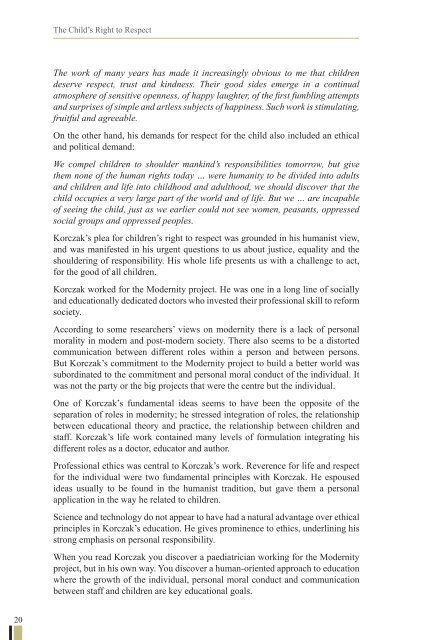Create successful ePaper yourself
Turn your PDF publications into a flip-book with our unique Google optimized e-Paper software.
20<br />
<strong>The</strong> Child’s <strong>Right</strong> <strong>to</strong> <strong>Respect</strong><br />
<strong>The</strong> work of many years has made it increasingly obvious <strong>to</strong> me that children<br />
deserve respect, trust and kindness. <strong>The</strong>ir good sides emerge in a continual<br />
atmosphere of sensitive openness, of happy laughter, of the first fumbling attempts<br />
and surprises of simple and artless subjects of happiness. Such work is stimulating,<br />
fruitful and agreeable.<br />
On the other hand, his demands for respect for the child also included an ethical<br />
and political demand:<br />
We compel children <strong>to</strong> shoulder mankind’s responsibilities <strong>to</strong>morrow, but give<br />
them none of the human rights <strong>to</strong>day … were humanity <strong>to</strong> be divided in<strong>to</strong> adults<br />
and children and life in<strong>to</strong> childhood and adulthood, we should discover that the<br />
child occupies a very large part of the world and of life. But we … are incapable<br />
of seeing the child, just as we earlier could not see women, peasants, oppressed<br />
social groups and oppressed peoples.<br />
<strong>Korczak</strong>’s plea for children’s right <strong>to</strong> respect was grounded in his humanist view,<br />
and was manifested in his urgent questions <strong>to</strong> us about justice, equality and the<br />
shouldering of responsibility. His whole life presents us with a challenge <strong>to</strong> act,<br />
for the good of all children.<br />
<strong>Korczak</strong> worked for the Modernity project. He was one in a long line of socially<br />
and educationally dedicated doc<strong>to</strong>rs who invested their professional skill <strong>to</strong> reform<br />
society.<br />
According <strong>to</strong> some researchers’ views on modernity there is a lack of personal<br />
morality in modern and post-modern society. <strong>The</strong>re also seems <strong>to</strong> be a dis<strong>to</strong>rted<br />
communication between different roles within a person and between persons.<br />
But <strong>Korczak</strong>’s commitment <strong>to</strong> the Modernity project <strong>to</strong> build a better world was<br />
subordinated <strong>to</strong> the commitment and personal moral conduct of the individual. It<br />
was not the party or the big projects that were the centre but the individual.<br />
One of <strong>Korczak</strong>’s fundamental ideas seems <strong>to</strong> have been the opposite of the<br />
separation of roles in modernity; he stressed integration of roles, the relationship<br />
between educational theory and practice, the relationship between children and<br />
staff. <strong>Korczak</strong>’s life work contained many levels of formulation integrating his<br />
different roles as a doc<strong>to</strong>r, educa<strong>to</strong>r and author.<br />
Professional ethics was central <strong>to</strong> <strong>Korczak</strong>’s work. Reverence for life and respect<br />
for the individual were two fundamental principles with <strong>Korczak</strong>. He espoused<br />
ideas usually <strong>to</strong> be found in the humanist tradition, but gave them a personal<br />
application in the way he related <strong>to</strong> children.<br />
Science and technology do not appear <strong>to</strong> have had a natural advantage over ethical<br />
principles in <strong>Korczak</strong>’s education. He gives prominence <strong>to</strong> ethics, underlining his<br />
strong emphasis on personal responsibility.<br />
When you read <strong>Korczak</strong> you discover a paediatrician working for the Modernity<br />
project, but in his own way. You discover a human-oriented approach <strong>to</strong> education<br />
where the growth of the individual, personal moral conduct and communication<br />
between staff and children are key educational goals.


